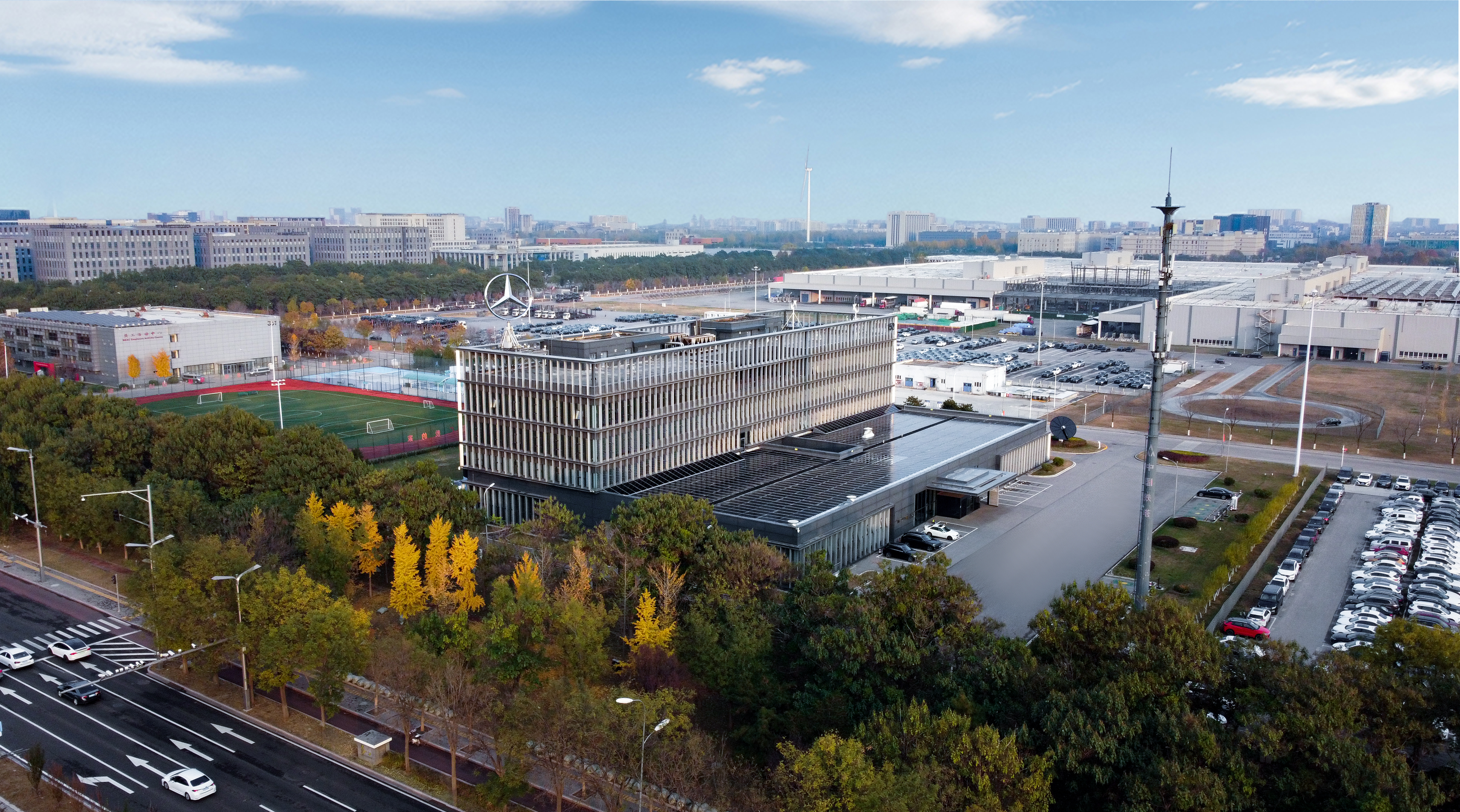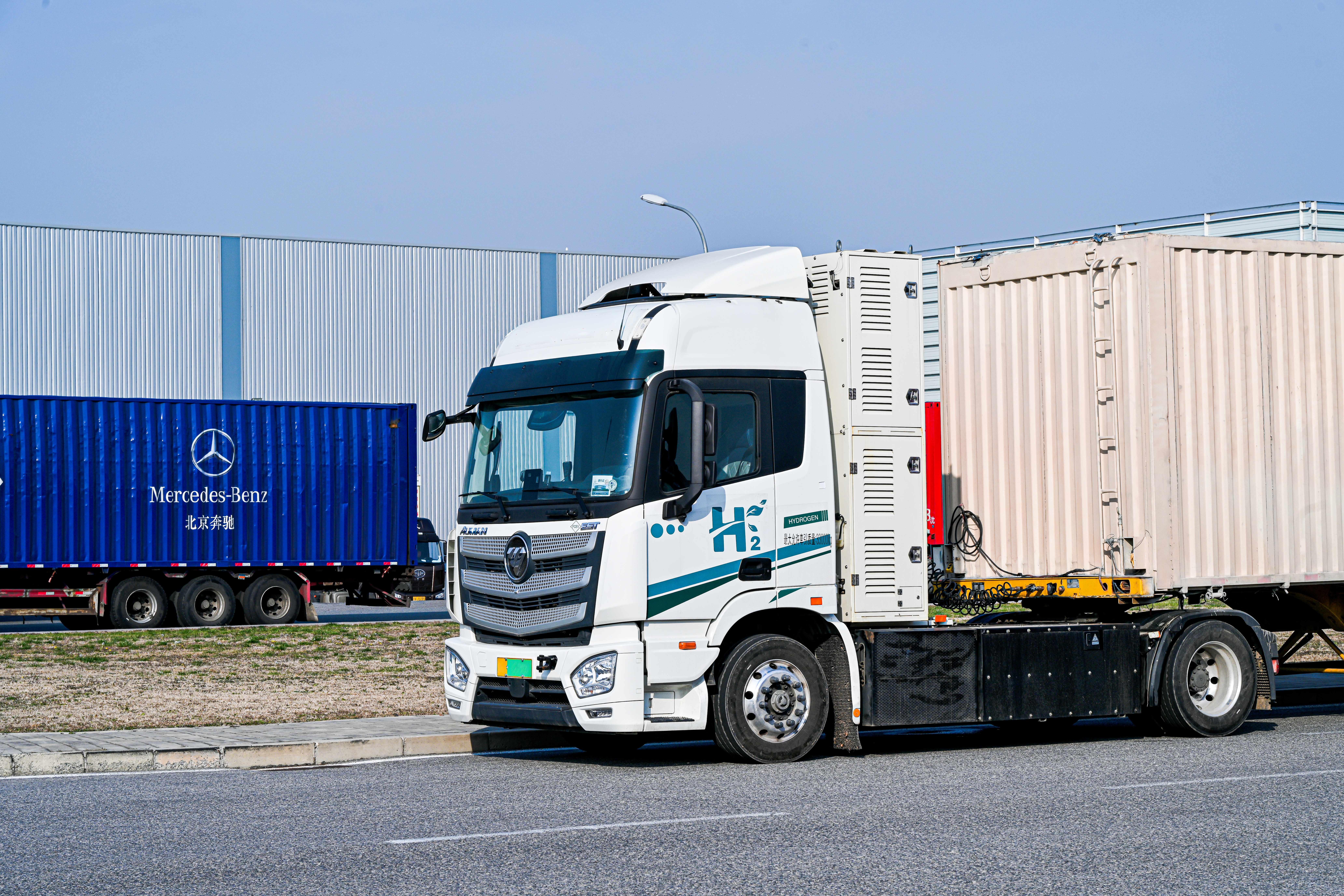|
BBAC Launches Zero Carbon Innovation Project, Empowering New Quality Productive Forces and Creating New Pathways for Low-Carbon Transformation
|
| Source: Release Time: 2024-12-18 16:54:36 |
|
[December 17, 2024, Beijing] BBAC has officially launched the BBAC Zero Carbon Technology Lab together with a new pilot project for short-distance parts transportation using hydrogen trucks. The initiatives represent significant milestones in accelerating the implementation of low-carbon innovation in development and logistics. “By integrating renewable energy, applying advanced energy management systems and carbon reduction technologies, we are redefining what it means to be environmentally responsible,” said Jörg Bartels, President and CEO of BBAC. “These innovative practices not only reduce our environmental impact but also make us a ‘lighthouse’ of production decarbonization, setting new industry standards for a new era of sustainability while building a more sustainable future.” “Driven by digitalization and emissions reduction, BBAC has consistently pursued a combined approach to low-carbon transformation and expanded new zero-carbon application scenarios,” said Zhang Zhengye, Party Secretary and Senior Executive Vice President of BBAC. “The successful implementation of these innovation projects will provide valuable experience for future large-scale construction of low-carbon eco-plants and offer exemplary green solutions for the industry.”
Digitalization-driven low-carbon plants accelerate the development toward a carbon-neutral future The BBAC Zero Carbon Technology Lab fully leverages digital-twin technology to accurately simulate and optimize energy supply, conversion, and consumption processes. Using intelligent algorithms to predict energy demand, it effectively reduces costs and carbon emissions while significantly enhancing energy efficiency, creating an effective and sustainable practice model.
The Lab also serves as an active training center, equipping employees with the essential knowledge and skills needed for a sustainable future. Through real-world training provided by the Lab, in conjunction with the in-house Low Carbon Academy, Low Carbon Learning Festival, Low Carbon Forum, and other diverse initiatives, BBAC is steadily improving its talent training system for sustainable development. This commitment ensures the cultivation of professionals specialized in low-carbon technologies and skills to support BBAC’s sustainable and high-quality development.
When fully operational, the overall carbon emissions of the building where the Lab is located will be reduced by 50%, while 50% of energy used will derive from self-generated green electricity. The building is expected to achieve 100% green electricity usage by 2026. Based on the experience of the Lab, BBAC plans to expand this advanced energy management model company-wide, comprehensively enhancing the precision, intelligence, and digitalization of energy management across all plants, building a zero-carbon energy management system geared toward a sustainable future.
Two-way empowerment of digitalization and low-carbonization creates a new zero-carbon logistics model During the official opening ceremony for the BBAC Zero Carbon Technology Lab, BBAC also launched the Zero-Carbon Logistics pilot project, reinforcing its commitment to environmentally friendly transportation solutions. The project spans the entire logistics process, achieving in-depth integration of logistics digitalization and emissions reduction through the use of hydrogen trucks, unmanned forklifts, Omnidirectional AGV, recyclable packaging, and other advanced practices. In this pilot project, hydrogen trucks in particular play a pivotal role in achieving sustainable short-distance transportation. Through rigorous testing, these trucks have successfully demonstrated net-zero emissions in actual use scenarios. Compared to conventional fuel trucks, the hydrogen-powered trucks significantly cut CO2 emissions by nearly 200 kg per day -- a reduction comparable to the daily carbon absorption capacity of 4,000 trees.
In addition, BBAC has developed the Green Pulse Power System in partnership with a leading Chinese university. This robust system enables accurate tracking and detailed analysis of carbon emissions data as part of its comprehensive data-driven optimization of regional logistics efficiency, further enhancing the effectiveness of logistics operations. In parallel with its in-depth efforts to reduce carbon emissions in transportation, BBAC Logistics has initiated several environmental protection measures aimed at minimizing waste throughout the logistics process, including packaging, warehousing, and information management. BBAC’s recyclable packaging materials are now used for more than 95% of parts and components, reducing solid waste by approximately 4,427 tons annually. Additionally, the implementation of a paperless work system in Logistics has saved about 18 tons of paper so far.
Accelerating the transition to green energy for clean and sustainable development With these new breakthroughs in both “zero-carbon” buildings and “zero-carbon” logistics, BBAC has reached a new milestone in its journey towards building a sustainable energy infrastructure. Since the initiation of the company’s photovoltaic (PV) power generation project in 2014, BBAC has continuously adopted advanced technologies and equipment to significantly enhance installed PV capacity. Today, all BBAC plants are equipped with photovoltaic power generation systems, covering a large rooftop area of nearly 217,790 ㎡, equivalent to about 30 football pitches, with an annual power generation capacity up to 40,000 MWh. By the beginning of 2025, BBAC will have expanded its solar capacity to 90 MWp, which will cover 20% of BBAC’s energy needs for production.
Thanks to its long-term dedication to PV construction, BBAC has become one of the largest photovoltaic plants in Beijing and of any automotive plants in China. In addition to advancing its own renewable energy infrastructure, BBAC continues to increase its procurement of sustainable electricity. BBAC was one of the first companies in Beijing to commit to sustainable electricity purchasing, having done so consistently for four consecutive years. By the end of 2024, BBAC is expected to have purchased at least 300 GWh of renewable energy. By 2026, BBAC’s green electricity procurement is expected to reach 400 million kWh, which is projected to reduce carbon emissions by more than 240,000 tons, further driving its progress toward achieving 100% sustainable electricity supply by 2028.
Achieving life-cycle transformation from the source of production to battery recycling Reducing carbon emissions at the source of production is a key element in low-carbon transformation. To this end, BBAC has set carbon emissions reduction objectives for key raw materials such as steel, aluminum, copper, plastics, and battery cell components. Since 2022, BBAC has conducted a series of projects to evaluate the technical feasibility and application potential of materials such as low-carbon steel and aluminum in vehicle production, while proactively exploring other raw materials, such as glass and copper, with the aim of incorporating more low-carbon materials throughout the entire vehicle value chain. Additionally, as part of the Mercedes-Benz closed-loop power battery recycling management program in China, BBAC is actively promoting the reuse of tryout batteries in its productions and operations, maximizing the entire lifecycle value of tryout batteries. At the cell level, BBAC adheres to a “safety-first” policy, transforming tryout batteries into intelligent and secure AGV batteries through advanced remanufacturing technologies, resulting in batteries that are equipped with real-time monitoring modules and aerosol-based heat-sensing fire suppression devices. The batteries have already been widely applied in logistics, distribution, and other operational scenarios. BBAC has also converted tryout battery packs into high-efficiency energy storage devices, demonstrating the potential to fully leverage existing power resources through an “off-peak charging and peak-time discharging” model.
The launch of the BBAC Integrated Zero-Carbon Innovation Demonstration Project provides valuable experience for promoting the sustainable development of the entire industry chain while also enhancing BBAC’s own competitive advantage. Adhering to Mercedes-Benz’s “Ambition 2039” strategy and BAIC’s “BLUE Plan”, BBAC remains committed to exploring the deep integration of digitalization and low carbonization. Through its efforts to enhance cooperation with a wide range of sectors in sustainable development, BBAC will work to continuously drive sustainable progress in the automotive industry and the economy of Beijing to enable higher-quality development. |
Contact Us
|
Legal Policy│
Privacy statement│
Friendship link│
Site map│
Hot Tel: 400-810-8880 Copyright: 2026 Beijing Benz Automotive Co., Ltd. 京ICP备05050259号-1
 京公网安备 11011502003823号
京公网安备 11011502003823号







